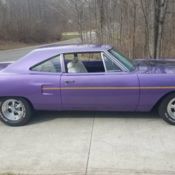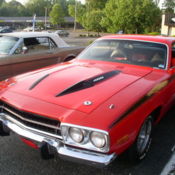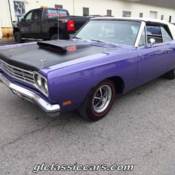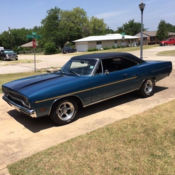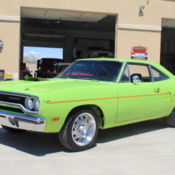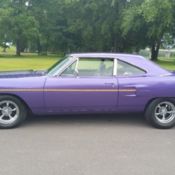1970 Plymouth Roadrunner Convertible 4-Speed Rare Low Reserve
| Make: | Plymouth |
| Model: | Road Runner |
| SubModel: | Roadrunner |
| Type: | Convertible |
| Year: | 1970 |
| Mileage: | 79,880 |
| VIN: | RM27N0G160125 |
| Color: | Orange |
| Fuel: | Gasoline |
| Transmission: | Manual |
| Interior color: | Black |
| Vehicle Title: | Clear |
| Item location: | Rochester, New York, United States |
| Extras |
|
Convertible |
| Listed by | Private seller |
Description of 1970 Plymouth Road Runner Roadrunner |
| View Our Other Listings | Contact Us | Print this listing 1970 Plymouth Roadrunner Convertible 4-Speed Rare Low ReserveGREAT LAKES CLASSIC CARS1128 Lexington Ave Bldg 4 Suite CRochester. NY 14606Call Us Today(800) 510-3797Ask Us A Question Vehicle DetailsYear: 1970Make: PlymouthModel: Road RunnerVIN: RM27N0G160125Stock Number: E0288Mileage: 79880Transmission: ManualEngine: 8 Cylinder. 6. 27 LExterior Color: OrangeInterior Color: BlackTitle: Clear Great LakesClassic Cars presents 1970 Plymouth RoadrunnerConvertible4-Speed One of ONLY 179 Convertible 4-Speeds Built. Take into consideration the Color and Equipment. that 'built' number decreases significantly. The data tag decodes asE63=383-4bblD21=HD 4-Speed Manual w Reverse LightRM27R=Plymouth RoadrunnerM=Medium Grade Class27=ConvertibleN0GN=383HP/4bbl 8Cyl0=1970G=St. Louis. MO USA160125= Build SequenceEK2=Go-Mango/Vitamin C OrangeH2X9 Trim Grade/Style/ColorH=High2=Vinyl BenchX9=BlackTX9=Upper door frame (Blk)B14=Build date 11/14/1969073219=Order #V3X=Roof Type:Convertible BlackA01=Light PackageJ25=3-Speed Var. WipersJ45=Hood Tie Down PinsL31=Hood/Fender Mount Turn SignalsM31=Belt MoldingR11=Music Master Radio AMV21=Performance Hood TreatmentV8X=Transverse Stripe BlackEnd=End of Codes As you can see. this is an extremely rare Roadchicken with the right equipment and color making it desirable to own and collect. Here's our opinion on condition. /p>This Roadrunner has had the floors replaced with correct stamped panels and fit perfectly. Trunk floor and Dr's Side Lower Quarter was done as well. Respectable job. Repainted the Factory Original Vitamin C Orange to what we would consider a decent job. This Roadrunner was not restored to Museum Grade. it was restored to be enjoyed as a summer cruiser and Car Shows where it would and does draw a crowd. Equipped with a power top and new correct replacement convertible top allows you to enjoy the warm sun and catch some rays by simply pushing a button. We do not have a build sheet but were able to find the numbers that really matter and they match. the partial VIN is legible on the driveline. We opt to order brand new 15" Magnum Wheels from Coker Tire and they look great on the car. The Interior shows well and is clean. the dash lenses are a bit clouded but no big deal. Overall this Roadrunner is an easy assessment on a grading scale 1-5 with 1 being trailer-queen museum and 5 needing restoration. we would easily and conservatively give a grade of 2. 5 1970 Plymouth Road Runner History The Plymouth Road Runner was a no-frills muscle car built by the Plymouth division of the Chrysler Corporation in the United States between 1968 and 1980. In 1968. the first muscle cars were. in the opinion of many. moving away from their roots as relatively cheap. fast cars as they gained options. Although Plymouth already had a performance car in the GTX. designers decided to go back to the drawing board and reincarnate the original muscle car concept. Plymouth wanted a car able to run 14-second times in the quarter mile (1. 20 ft. 402 m) and sell for less than US$3000. Both goals were met. and the low-cost muscle car hit the street. The success of the Road Runner would far outpace the upscale and lower volume GTX. with which it was often confused. Paying $50. 00 to Warner Brothers to use the name and likeness of their Road Runner cartoon character (as well as a "meep. meep" horn. which Plymouth paid $10. 00 to develop). and using the Chrysler B platform as a base (the same as the Belvedere. Satellite. and GTX). Plymouth set out to build a back-to-basics muscle car. Everything essential to performance and handling was beefed-up and improved; everything nonessential was left out. The interior was spartan. lacking even carpets in early models. and few options were available. A floor-mounted shifter featured only a rubber boot and no console so that a bench seat could be used. The earliest of the 1968 models were available only as 2-door coupes (with a center post between the front and rear windows). but later in the model year a 2-door "hardtop" model (sans center post) was offered. The Road Runner of 1968-1970 was based on the Belvedere. while the GTX was based on the Satellite. a car with higher level trim and slight differences in the grilles and taillights. The "heart with an arrowhead at bottom" design was part of Plymouth's ad campaign that year. The Road Runner is holding a helmet with the same symbol on it. The standard engine was a 383 CID (6. 3 L) Roadrunner V8 rated at 335 bhp (250 kW) and 425 lb·ft (576 N·m) of torque. For an extra $714. Plymouth would install a 426 CID Hemi rated at 425 bhp (317 kW) and 490 lb·ft (664 N·m) of torque. Combined with low weight. the 6-passenger Road Runner could run the 1/4 mile in 13. 5 seconds at 105 mph (169 km/h). It would prove to be one of the best engines of the muscle car era. and the Road Runner one of the best platforms to utilize it. Plymouth expected to sell about 2. 00 units in 1968; actual sales numbered around 45. 00. (It should also be noted Dodge debuted the Road Runner's cousin. the Super Bee. that same year. ) The 1969 model kept the same basic look and was slightly changed cosmetically (i. e. rear tail lights. optional bucket seats. new Road Runner decals). The Road Runner added a convertible option for 1969 with 2. 28 drop top models produced that year. and only ten with the Hemi (j code). Six of those Hemi convertibles were automatics. and only 4 four-speed cars. Three are known to exist. An "Air Grabber" option (N96 code) was introduced this year; it consisted of an air duct assembly bolted to the underside of the hood that connected to twin rectangular upward-facing scoops in the hood. When the hood was closed. a rubber seal fitted over a large oval unsilenced air cleaner assembly that ducted air directly into the engine. The scoops in the hood could be opened and closed via a lever under the dashboard. While the 383 engine remained the standard power plant. a 440 CID engine with three two-barrel carburetors. known as the 440-6bbl. was added to the lineup at mid-year to qualify the engine for the Super Stock drag racing class. Dodge marketed its three two-barrel setup as the 440 Six Pack on Super Bee models and this familiar moniker is often mistakenly associated with Plymouths. The 440-6bbl Road Runners had no wheel covers or hubcaps. had flat black wheels. and a organisol black lift-off fiberglass hood with functional hood scoop. Its 440 engine produced 390 hp (291 kW) and 490 lb·ft (664 N·m) of torque at 3200 rpm. very similar numbers to the Hemi and at a lower engine speed. This meant the cheaper 440 6bbl was nearly as fast as the 426 Hemi. at least up to highway speeds. This option. along with the economical yet fast 383 and the outrageously fast Hemi helped propel Plymouth. and corporate sibling Dodge. to the top of the dragstrip echelon. This model of Road runner and Super Bee had a Code M as the fifth character in the VIN and was also known as the A12 model. The Road Runner was named Motor Trend Car of the Year for 1969. Sales almost doubled to 82. 09. 1970 brought new front and rear end looks to the basic 1968 body. and it would prove to be another success. The design and functionality of the Air Grabber option was changed this year to increase both efficiency and the intimidation factor A switch below the dash actuated a vacuum servo to slowly raise the forward-facing scoop. exposing shark like teeth on either side. "High Impact" colors. like In-Violet. Rallye Red. Moulin Rouge. and Vitamin C were options available for that year. The 1970 Road Runner and GTX continued to be attractive and popular cars. The engine lineup was left unchanged. This was to be the second and last year of the road runner convertible. with only 834 made. These cars are considered more valuable then the 1969 version due to a better dash. high impact colors and more options. History of the A-833 TransmissionThe A-833 four-speed was produced from 1964 until roughly 1986. It is noted for its strength and durability. From 1964 until 1972. it was built in two typical mechanical configurations. one with an 18-spline input shaft and the other with a 23-spline input shaft. These shafts are not interchangeable alone. The entire gearset is matched and must be changed as an assembly. Typically. the 23-spline units were installed in small block cars and big block cars up to 426 cubic inches (wedge head in 1965). Later. it was also found behind the 383 and 400 cubic-inch engines. The 18-spline unit is popularly known as the “HEMI” four-speed. These were used in the cars equipped with the 440 cubic inch engine (1966 to 1972) and the famous 426 hemi engine (1964 to 1971). After 1972. the 1:1 final drive ratio gearset was made for another two years. bringing its production run to an end in 1974. However. there was an overdrive unit that was made from the early 1970’s until roughly 1986. This had a final drive ratio of . 73:1. During the early years of this run. it was mainly used in A- and F-body cars (Darts. Dusters. etc. and Aspens/Volares). The later years of this production run were installed mainly in trucks. Over the years. there were several different designs of internal parts. such as synchronizers and gearsets. There are also several different case configurations. The most obvious visual differences of the A-833 are the overall length. and the output shafts. Early trannys feature a flanged yoke connecting to the driveshaft. Later models had a slip yoke. Chrysler made A-833s in two different lengths over the years. and while the main gear housings were sized the same — and for the most part were the same casting for most models — the tail-shaft housing differed. A- and F-bodied cars received the shorter output shaft and housings. B-. C-. and E-bodies received longer tail-shafts. The flanged ball-and-trunion output shaft was used in 1964 and 1965. In 1966. the slip-yoke output replaced the ball-and-trunion on all A-833s. SPECIFICATIONS 1970 Road Runner-Superbird-GTX Production Figures Engine/TransmissionCoupeHardtopConvertibleSuperbirdGTX383-4 3-speed1. 305841300383-4 4-speed5. 397. 9317900383-4 automatic6. 8811. 3942900383-4 total 14. 5723. 7162100440-4 4-speed0004581471440-4 automatic0106264927440-4 total0101. 846398440-6 4-speed45169720308350440-6 automatic22243314408328440-6 total6511. 3034716678426 Hemi 4-speed445915843426 Hemi automatic301627729426 Hemi total7475313572Total Production15. 1624. 448241. 357. 48Total = 51. 67 If you have any questions about this or any of our other auctions please feel free to contact us via e-mail sales@glclassiccars. comor you can call us at (800) 510-3797. Thank you for your interest and we look forward to hearing from you. Features & OptionsAccent StripesChrome BumperChrome WheelsClockConvertibleCoolant Temp. GaugeDual ExhaustFloor MatsHD 4-Speed ManualPower SteeringRadial tiresRear-Wheel DriveSport Steering WheelTachometerV-Style Engine Additional Photos Warranty InformationAS IS - NO WARRANTYThis vehicle is being sold as is. where is with no warranty. expressed written or implied. The seller shall not be responsible for the correct description. authenticity. genuineness. or defects herein. and makes no warranty in connection therewith. No allowance or set aside will be made on account of any incorrectness. imperfection. defect or damage. Any descriptions or representations are for identification purposes only and are not to be construed as a warranty of any type. It is the responsibility of the buyer to have thoroughly inspected the vehicle. and to have satisfied himself or herself as to the condition and value and to bid based upon that judgement solely. The seller shall and will make every reasonable effort to disclose any known defects associated with this vehicle at the buyer's request prior to the close of sale. Seller assumes no responsibility for any repairs regardless of any oral statements about the vehicle. Terms & ConditionsWinning bidder must contact us within 24 hours of auction end. and make arrangements for payment at that time. A $500. 00 deposit is due within 24 hours of end of auction. The remainder is due within 3 business days of Auction end. If no contact is made within 24 hours we reserve the right to re-list the vehicle. sell it to the next high bidder. or sell it otherwise. Most banks and credit unions do not finance vehicles older than 1995 or with more than 100K miles. Make sure if financing. your financial institution accepts the year and miles of this vehicle before bidding. Please arrange financing prior to bidding. Buyer is responsible for pickup or shipping of this vehicle. If you wish to have it shipped using a service. we will gladly cooperate. you can locate shippers by doing a search for `auto shippers`. If you are not sure about something. Please ASK. Do not assume anything not listed is included. We reserve the right to cancel bids for excessive negative feedback. We reserve the right to end the listing if the vehicle is no longer available for sale. All non-paying high bidders will be reported to Ebay. and negative feedback posted. PLEASE ONLY BID WHAT YOU ARE WILLING TO PAY. IF THE RESERVE IS NOT MET. WE MAY CONTACT THE HIGH BIDDER TO OFFER THE SECOND CHANCE OPTION. Fee and Tax Information:Any and all questions. please don't hesitate to contact us directly. About UsWE ALWAYS DO OUR BEST TO DESCRIBE EXACTLY WHAT WE SEE AND KNOW ABOUT THE ITEM YOU'RE BIDDING ON. "IF YOU DON'T KNOW OR ARE NOT SURE PLEASE CALL. " Please don't hesitate to contact us. tel: 800-510-3797e-mail: sales@glclassiccars. com . We will be more than happy to speak to you. Thank youSee our other listings |
 Home
Home Contact us
Contact us NEWEST CARS
NEWEST CARS SELL YOUR CAR
SELL YOUR CAR FAQ
FAQ